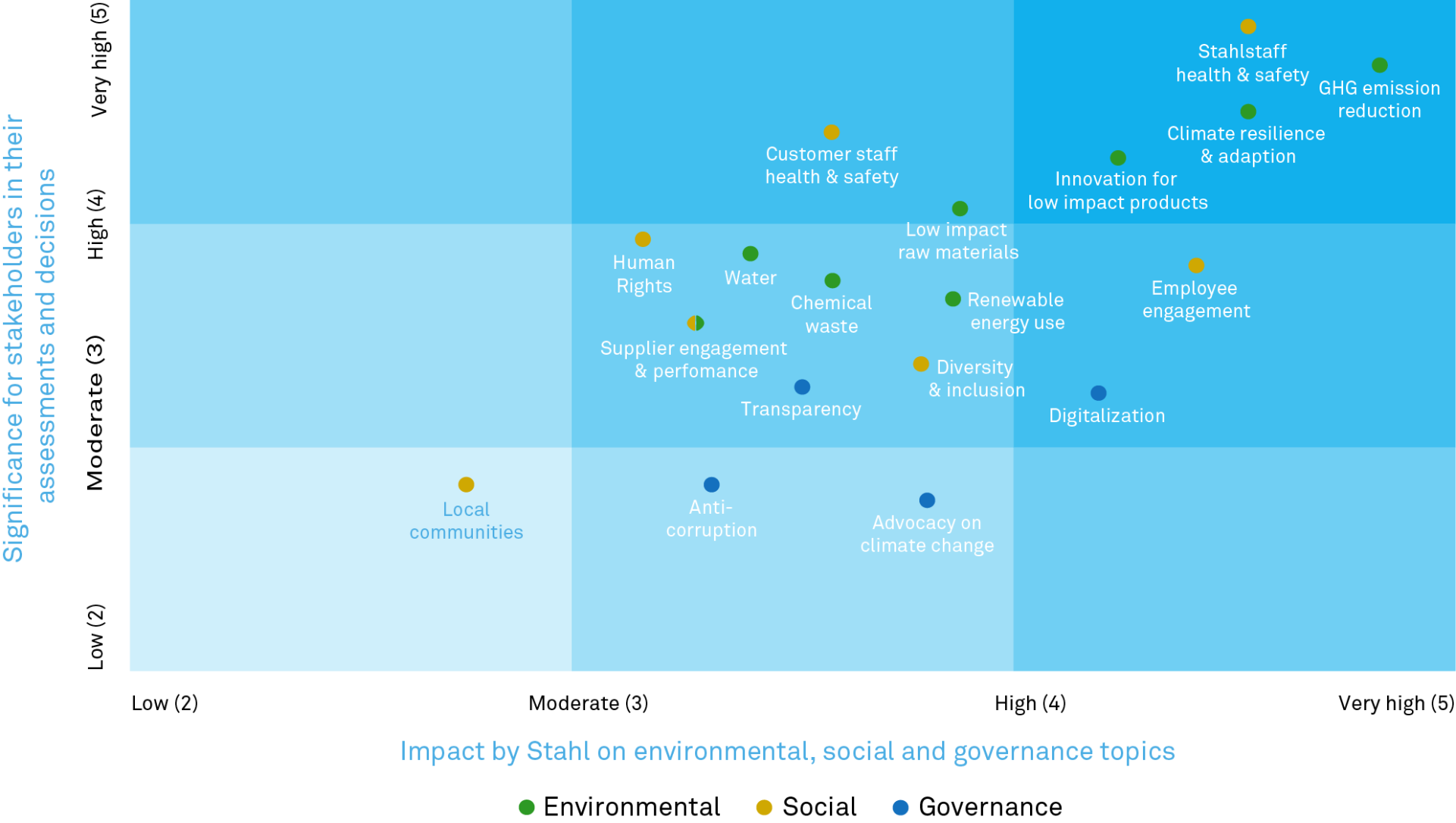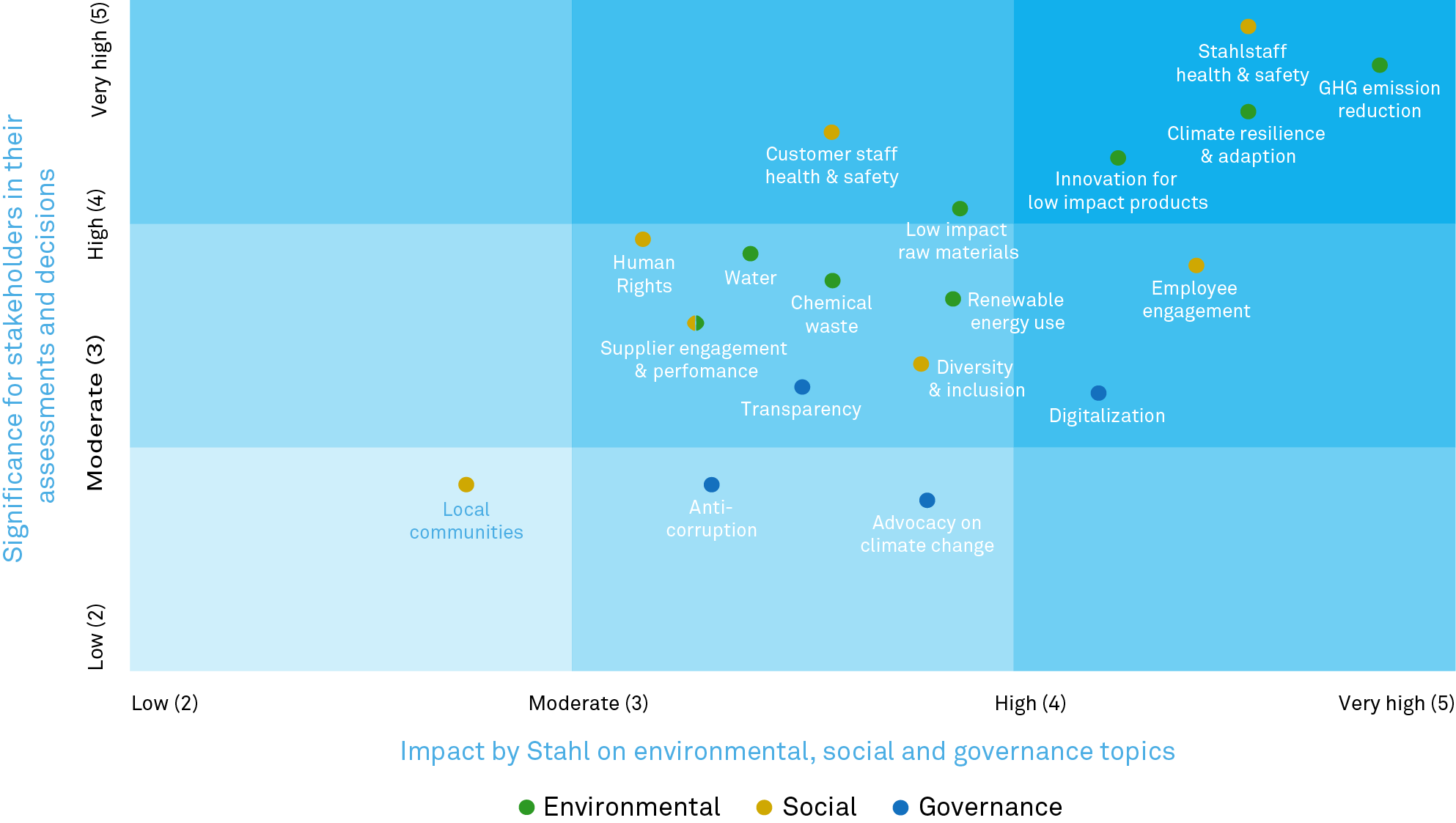

Back to overview

Scroll
down

Find out more about this report, including how we approached the materiality process and engaged stakeholders.
About Stahl’s ESG Report 2021
Our reporting period runs from January 1, 2021 up to and including December 31, 2021 and we have an annual reporting cycle with reports published in March, as per the UN Global compact deadline. The date of our most recent report is March 19, 2021.
This report has been prepared, whenever possible, in accordance with the GRI Standards: Core option. Download our 2021 GRI Content Index here. As indicated in the text and tables, our Environmental, Safety and HR data have been validated by a third party verifier (Deloitte in 2021).
Stahl has published annual reports on environment, social and governance topics since 2013. The Global Reporting Initiative (GRI) sustainability reporting standards, the United Nations (UN) Global Compact and the 17 Sustainable Development Goals (SDGs) have been key references in the preparation of these reports and continue to provide valuable guidance for the company.
Stakeholder engagement
Stakeholder engagement is fundamental to our ESG strategy: we engage with a variety of stakeholders within and external to Stahl to understand what different groups consider our most material impacts. There is increasing engagement with the wider chemical industry, as shown in our growing involvement with industry initiatives such as the Responsible Chemistry Initiative (RCI).
In 2021 a series of independent interviews were arranged with key Stahl shareholders about materiality. This was part of our continuous engagement with our primary stakeholders, which include our employees, customers, suppliers, investors and distributors and agents, and our secondary stakeholders, which are academic institutions, government (including public authorities), industry associations and foundations, consumer brands, NGOs and civil society.
Materiality
Stahl’s approach to reporting and materiality is based on recognized, internationally agreed guidelines, like the Global reporting Initiative (GRI). This approach also ensures that the full scope of activities is taken into account, from operations and supply chain to interactions with suppliers, customers, consumers, shareholders, government and NGOs.
In 2021, we updated our materiality analysis through desk research and interviews with key stakeholders such as suppliers, customers and industry experts. Our identified material topics are captured in the visual below. These topics impact the company, our environment and our stakeholders, independent of mitigation policies and activities that may be in place to reduce them.

Materiality Matrix 2021

Back
to top

Back to overview

Back
to top
Please swipe for full visual

Materiality Matrix 2021
Materiality
Stahl’s approach to reporting and materiality is based on recognized, internationally agreed guidelines, like the Global reporting Initiative (GRI). This approach also ensures that the full scope of activities is taken into account, from operations and supply chain to interactions with suppliers, customers, consumers, shareholders, government and NGOs.
In 2021, we updated our materiality analysis through desk research and interviews with key stakeholders such as suppliers, customers and industry experts. Our identified material topics are captured in the visual below. These topics impact the company, our environment and our stakeholders, independent of mitigation policies and activities that may be in place to reduce them.
Stakeholder engagement
Stakeholder engagement is fundamental to our ESG strategy: we engage with a variety of stakeholders within and external to Stahl to understand what different groups consider our most material impacts. There is increasing engagement with the wider chemical industry, as shown in our growing involvement with industry initiatives such as the Responsible Chemistry Initiative (RCI).
In 2021 a series of independent interviews were arranged with key Stahl shareholders about materiality. This was part of our continuous engagement with our primary stakeholders, which include our employees, customers, suppliers, investors and distributors and agents, and our secondary stakeholders, which are academic institutions, government (including public authorities), industry associations and foundations, consumer brands, NGOs and civil society.
About Stahl’s ESG Report 2021
Our reporting period runs from January 1, 2021 up to and including December 31, 2021 and we have an annual reporting cycle with reports published in March, as per the UN Global compact deadline. The date of our most recent report is March 19, 2021.
This report has been prepared, whenever possible, in accordance with the GRI Standards: Core option. Download our 2021 GRI Content Index here. As indicated in the text and tables, our Environmental, Safety and HR data have been validated by a third party verifier (Deloitte in 2021).
Stahl has published annual reports on environment, social and governance topics since 2013. The Global Reporting Initiative (GRI) sustainability reporting standards, the United Nations (UN) Global Compact and the 17 Sustainable Development Goals (SDGs) have been key references in the preparation of these reports and continue to provide valuable guidance for the company.
Find out more about this report, including how we approached the materiality process and engaged stakeholders.


